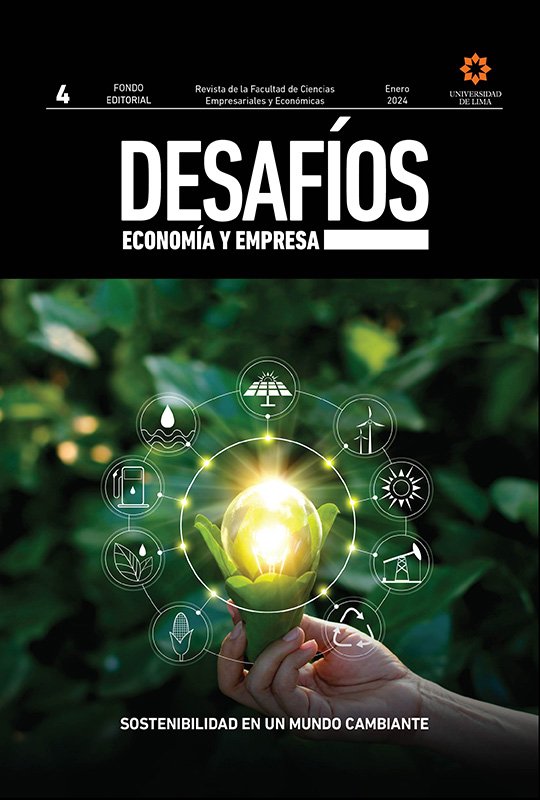Moda y ecología: multinacionales fast fashion, huella de carbono y percepciones de los consumidores españoles y peruanos
DOI:
https://doi.org/10.26439/ddee2024.n04.5906Keywords:
fast fashion, sustainability, consumerism, Peruvian, SpanishAbstract
In order to meet the growing demand, fashion companies have developed a large production chain that generates a substantial negative impact on the environment, making them highly polluting. In that context, this research aims to analyze whether the ecological impact of fast fashion multinational companies has some effect on the perception of Peruvian and Spanish consumers. The analysis is based on information obtained from online surveys. It is found that consumers consider fast fashion multinational companies as “not so harmful to the environment”, a perception that would be conditioned by the scarce information on the actions of these companies on platforms such as social networks. Another relevant explanatory factor is greenwashing, an unethical strategy based on advertising that emphasizes the notion of “eco-friendly”, but at the same time does not provide information about the materials or production processes which are applied.
Downloads
References
Ariely, D. (2008). Las trampas del deseo: cómo controlar los impulsos irracionales que nos llevan al error. Ariel.
Brydges, T. (2021). Closing the loop on take, make, waste: investigating circular economy practices in the Swedish fashion industry. Journal of Cleaner Production, 293, 126245. https://doi.org/10.1016/j.jclepro.2021.126245
Cristófol, C., Mcquillan, K., & Segarra-Saavedra, J. (2021). La comunicación de la sostenibilidad como herramienta de ventas y de cambio social: sast fashion vs. slow fashion. Revista de Comunicación de la SEECI, (54), 17-37. https://doi.org/10.15198/seeci.2021.54.e667
Datos Macro. (2020a). España: pirámide poblacional. https://datosmacro.expansion.com/demografia/estructura-poblacion/espana
Datos Macro. (2020b). Perú: pirámide poblacional. https://datosmacro.expansion.com/demografia/estructura-poblacion/peru
Data Commons. (2020). Spain - place explorer - data commons. https://datacommons.org/place/country/ESP?utm_medium=explore&mprop=minimumWage&hl=en
Muñoz-Valera, S. (2020). La ecologización de la industria de la moda: actores y procesos. Revista Andaluza de Ciencias Sociales, (19), 199-223. https://doi.org/10.12795/anduli.2020.i19.09
Nayak, R., Akbari, M., & Maleki, S. (2019). Recent sustainable trends in Vietnam’s fashion supply chain. Journal of Cleaner Production, 225, 291-303. https://doi.org/10.1016/j.jclepro.2019.03.239
Parés, P. (2018). Comportamiento del consumidor respecto a la moda ética. http://hdl.handle.net/11531/18969
Peters, G., Li, M., & Lenzen, L. (2021) The need to decelerate fast fashion in a hot climate: A global sustainability perspective on the garment industry. Journal of Cleaner Production, 295, 1-8. https://doi.org/10.1016/j.jclepro.2021.126390
Sandhu, A. (2019). Pretty clothes, ugly truth. Pakistan & Gulf Economist, 38(11), 14-16. https://www.pakistangulfeconomist.com/2019/03/11/pretty-clothes-ugly-truth/
Sorensen, K., & Johnson, J. (2019). Millennial perceptions of fast fashion and secondhand clothing: An exploration of clothing preferences using Q methodology. Social Sciences, 8(9), 244. https://doi.org/10.3390/socsci8090244
Toboso-Chavero, S. (2017). The unsustainability of fast fashion. Datatèxtil, 36, 56-62. https://raco.cat/index.php/Datatextil/article/view/321850.
Yoon, N., Lee, H. K., & Choo, H. J. (2020). Fast fashion avoidance beliefs and anticonsumption behaviors: the cases of Korea and Spain. Sustainability, 12(17), 6907. https://doi.org/10.3390/su12176907
Zák, Š., & Hasprová, M. (2020). The role of influencers in the consumer decision-making process. SHS Web Conferences, 74, 1-7. https://doi.org/10.1051/shsconf/20207403014
Zamani, B., Sandin, G., & Peters, G. (2017). Life cycle assessment of clothing libraries: can collaborative consumption reduce the environmental impact of fast fashion? Journal of Cleaner Production, 162, 1368-1375. https://doi.org/10.1016/j.jclepro.2017.06.128



